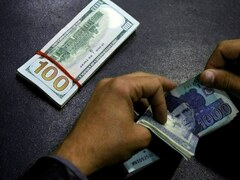NEW YORK: The dollar hovered around multi-year lows versus the euro and the Swiss franc on Tuesday as President Donald Trump’s attacks on the Federal Reserve raised concerns about the central bank’s independence.
Analysts said the dollar was left in an especially fragile state amid market concerns over the US administration’s tariffs, which could trigger a global trade war.
Doubts about Fed independence threaten the dollar’s value as a reserve currency, with analysts noting possible divestments from what many consider over-exposure to US assets.
The US currency accelerated losses after Thailand’s prime minister said trade negotiations with Washington - scheduled to begin on Wednesday - would be postponed.
Trump ramped up his criticism of Fed chief Jerome Powell on Monday, calling him a “major loser” and demanding that he lower interest rates “NOW” or risk an economic slowdown.
“The firing of Jerome Powell would be catastrophic for the US dollar and confidence in US capital markets in general,” said Adam Button, chief currency analyst at ForexLive.
“The market is hoping that sobriety prevails and that the US economy is allowed to continue to grow.”
On Friday, White House economic adviser Kevin Hassett said the president and his team were continuing to study whether they could fire Powell, who said last week the central bank can afford to be patient in judging how to set policy.
Money markets priced in a less than 10% chance of a Fed rate cut in May and 90 bps by year-end, roughly in line with the levels seen last week.
“The current worst-case scenario for the greenback is that Powell caves in and delivers an emergency rate cut, although that remains a low-probability event,” said Francesco Pesole, strategist at ING.
Barclays lifted its euro/dollar forecast to $1.15 based on the assessment of the removal of the Fed chair as a low-likelihood event, but argued that further revisions could therefore soon be needed should the situation escalate.
China on Monday accused Washington of abusing tariffs and warned countries against striking a broader economic deal with the United States at its expense.
The dollar was down 0.03% at 140.820 yen, after earlier falling below the psychological 140 level for the first time since mid-September.
The greenback rose 0.57% to 0.8138 Swiss franc, not far from the decade-low 0.8042 reached in the previous session.
The euro fell 0.38% to $1.1467, after jumping to $1.1573 on Monday for the first time since November 2021.
“Underlying dynamics differ and the yen’s rise looks more fragile than the euro’s,” said Shusuke Yamada, forex strategist at BofA Japan, after flagging that both currencies gained about 12% against the US dollar.























Comments